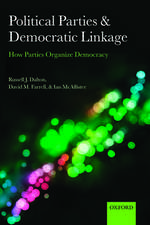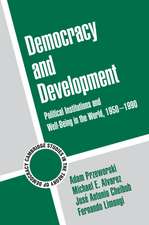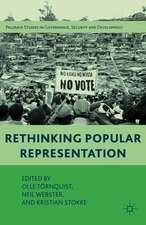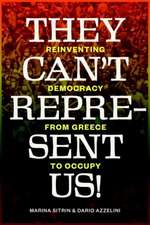Democracy Defended: Contemporary Political Theory
Autor Gerry Mackieen Limba Engleză Paperback – 26 noi 2003
| Toate formatele și edițiile | Preț | Express |
|---|---|---|
| Paperback (1) | 365.02 lei 6-8 săpt. | |
| Cambridge University Press – 26 noi 2003 | 365.02 lei 6-8 săpt. | |
| Hardback (1) | 873.67 lei 6-8 săpt. | |
| Cambridge University Press – 26 noi 2003 | 873.67 lei 6-8 săpt. |
Din seria Contemporary Political Theory
-
 Preț: 237.30 lei
Preț: 237.30 lei -
 Preț: 223.29 lei
Preț: 223.29 lei -
 Preț: 228.97 lei
Preț: 228.97 lei -
 Preț: 285.37 lei
Preț: 285.37 lei -
 Preț: 283.41 lei
Preț: 283.41 lei -
 Preț: 284.01 lei
Preț: 284.01 lei -
 Preț: 284.01 lei
Preț: 284.01 lei -
 Preț: 283.03 lei
Preț: 283.03 lei - 11%
 Preț: 568.81 lei
Preț: 568.81 lei -
 Preț: 205.24 lei
Preț: 205.24 lei -
 Preț: 289.78 lei
Preț: 289.78 lei -
 Preț: 288.04 lei
Preț: 288.04 lei -
 Preț: 289.95 lei
Preț: 289.95 lei -
 Preț: 284.01 lei
Preț: 284.01 lei -
 Preț: 284.01 lei
Preț: 284.01 lei -
 Preț: 321.14 lei
Preț: 321.14 lei -
 Preț: 203.50 lei
Preț: 203.50 lei -
 Preț: 282.65 lei
Preț: 282.65 lei -
 Preț: 230.51 lei
Preț: 230.51 lei - 19%
 Preț: 469.31 lei
Preț: 469.31 lei
Preț: 365.02 lei
Nou
Puncte Express: 548
Preț estimativ în valută:
69.85€ • 73.07$ • 58.02£
69.85€ • 73.07$ • 58.02£
Carte tipărită la comandă
Livrare economică 03-17 aprilie
Preluare comenzi: 021 569.72.76
Specificații
ISBN-13: 9780521534314
ISBN-10: 0521534313
Pagini: 500
Ilustrații: 5 b/w illus. 59 tables
Dimensiuni: 153 x 228 x 32 mm
Greutate: 0.79 kg
Ediția:New.
Editura: Cambridge University Press
Colecția Cambridge University Press
Seria Contemporary Political Theory
Locul publicării:Cambridge, United Kingdom
ISBN-10: 0521534313
Pagini: 500
Ilustrații: 5 b/w illus. 59 tables
Dimensiuni: 153 x 228 x 32 mm
Greutate: 0.79 kg
Ediția:New.
Editura: Cambridge University Press
Colecția Cambridge University Press
Seria Contemporary Political Theory
Locul publicării:Cambridge, United Kingdom
Cuprins
1. A long, dark shadow over democratic politics; 2. The doctrine of democratic irrationalism; 3. Is democratic voting inaccurate?; 4. The Arrow general possibility theorem; 5. Is democracy meaningless? Arrow's condition of unrestricted domain; 6. Is democracy meaningless? Arrow's condition of the independence of irrelevant alternatives; 7. Strategic voting and agenda control; 8. Multidimensional chaos; 9. Assuming irrational actors: the Powell Amendment; 10. Assuming irrational actors: the Depew amendment; 11. Unmanipulating the manipulation: the Wilmot proviso; 12. Unmanipulating the manipulation: the election of Lincoln; 13. Antebellum politics concluded; 14. More of Riker's cycles debunked; 15. Other cycles debunked; 16. New dimensions; 17. Plebiscitarianism against democracy; 18. Democracy resplendent.
Recenzii
'This brilliant counterrevolutionary book makes a frontal attack on the widely accepted claim that Kenneth Arrow's impossibility theorem for social choice shows democracy to be impossible, arbitrary, and meaningless. In delightfully direct and jargon-free language, Mackie demolishes the theoretical and empirical bases for this claim, notably in the strong version defended by William Riker and his students. His careful and exhaustive re-examination of all the instances on which Riker based his arguments is particularly valuable. At the same time, he puts up a strong defence - two cheers at least - for the institutions of representative democracy. After this vigorous and rigorous attack, social choice theory will never be the same again.' Jon Elster, Columbia University
'This is a true tour de force. Gerry Mackie has looked at many of William Riker's best known stories about great manipulations in American history. In almost every case, Riker's story does not hold up - but Mackie's story is as interesting as Riker's. This book is a must read for everyone interested in analytical narratives and political theory.' Iain McLean, University of Oxford
'Is democracy desirable? Is it even feasible? Much of the work in formal political analysis comes to a negative conclusion on both questions, leading researchers to believe that democracy is incoherent. In this remarkable book, Gerry Mackie has taken a position that contradicts most of the received results of the past fifty years. But he has done more than simply critique the existing work. He weaves together the notes of a paean to democracy, as it is actually practiced in the political world … The book is well-written, both in its scholarly and polemical voices. Some readers will be informed, and others will be outraged, by the arguments marshalled here. But anyone who is seriously interested in democracy or democratisation simply must give this book a close and thoughtful read.' Michael Munger, Duke University
'As a critique of the practical relevance of Arrow, the book is a true tour de force. Hopefully this impressive new book will invigorate the scholarly debate on voting, including what it means and how we should best go about it.' Perspectives on Political Science
'Mackie does an awfully nice job explaining and exploring Arrow's work … Mackie's chapter (six) on [Arrow's independence] condition, standing alone, is more than worth the price of this hefty volume. As careful as he is with Arrow's formal theory, though, Mackie's passionate interest - and original contribution - lies in shredding the extensions and empirical applications offered by the late William Riker and his followers at Rochester … Mackie's response [to Riker's most famous example of cycling] is so devastating, so mortifying, that I stopped breathing when I read it … Mackie is beyond tenacious, he is the Inspector Javert of polemics, in ruthlessly tracking down and demolishing every single purported instance of cycling Riker offered, as well as other instances floating around in the literature. His re-examination of the historical record in these cases is original and profound …Not many heretical tracts are as fun as this one, either.' Don Herzog, University of Chicago Law Review
'Democracy Defended, by Gerry Mackie, is the latest shooting star in the political science galaxy … the book contains may terrific points, as important to lawyers who think about appellate decisions, legislative intent, and voting law as to the book's intended audience.' Saul Levmore, University of Chicago Law School
'Mackie's volume is a path-breaking, thorough, and innovative overview of the subject of social choice and its implications for understanding democracy. It is made up of various lines of analysis including historical interpretation, a review of massive numbers of statistical studies and a careful analysis of numerous aspects of the proof of Kenneth Arrow's Impossibility Theorem. It will be 'must reading' for all who wish to understand democracy given the work in the social choice field over the last 50 years.' Social Justice Research
'This is a true tour de force. Gerry Mackie has looked at many of William Riker's best known stories about great manipulations in American history. In almost every case, Riker's story does not hold up - but Mackie's story is as interesting as Riker's. This book is a must read for everyone interested in analytical narratives and political theory.' Iain McLean, University of Oxford
'Is democracy desirable? Is it even feasible? Much of the work in formal political analysis comes to a negative conclusion on both questions, leading researchers to believe that democracy is incoherent. In this remarkable book, Gerry Mackie has taken a position that contradicts most of the received results of the past fifty years. But he has done more than simply critique the existing work. He weaves together the notes of a paean to democracy, as it is actually practiced in the political world … The book is well-written, both in its scholarly and polemical voices. Some readers will be informed, and others will be outraged, by the arguments marshalled here. But anyone who is seriously interested in democracy or democratisation simply must give this book a close and thoughtful read.' Michael Munger, Duke University
'As a critique of the practical relevance of Arrow, the book is a true tour de force. Hopefully this impressive new book will invigorate the scholarly debate on voting, including what it means and how we should best go about it.' Perspectives on Political Science
'Mackie does an awfully nice job explaining and exploring Arrow's work … Mackie's chapter (six) on [Arrow's independence] condition, standing alone, is more than worth the price of this hefty volume. As careful as he is with Arrow's formal theory, though, Mackie's passionate interest - and original contribution - lies in shredding the extensions and empirical applications offered by the late William Riker and his followers at Rochester … Mackie's response [to Riker's most famous example of cycling] is so devastating, so mortifying, that I stopped breathing when I read it … Mackie is beyond tenacious, he is the Inspector Javert of polemics, in ruthlessly tracking down and demolishing every single purported instance of cycling Riker offered, as well as other instances floating around in the literature. His re-examination of the historical record in these cases is original and profound …Not many heretical tracts are as fun as this one, either.' Don Herzog, University of Chicago Law Review
'Democracy Defended, by Gerry Mackie, is the latest shooting star in the political science galaxy … the book contains may terrific points, as important to lawyers who think about appellate decisions, legislative intent, and voting law as to the book's intended audience.' Saul Levmore, University of Chicago Law School
'Mackie's volume is a path-breaking, thorough, and innovative overview of the subject of social choice and its implications for understanding democracy. It is made up of various lines of analysis including historical interpretation, a review of massive numbers of statistical studies and a careful analysis of numerous aspects of the proof of Kenneth Arrow's Impossibility Theorem. It will be 'must reading' for all who wish to understand democracy given the work in the social choice field over the last 50 years.' Social Justice Research
Notă biografică
Descriere
A theoretical and empirically spirited defence of democratic governance.

















